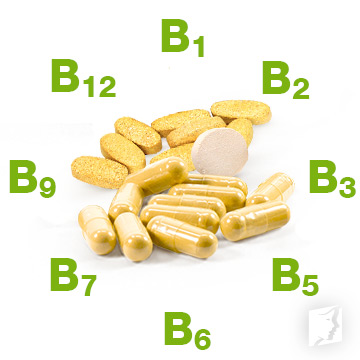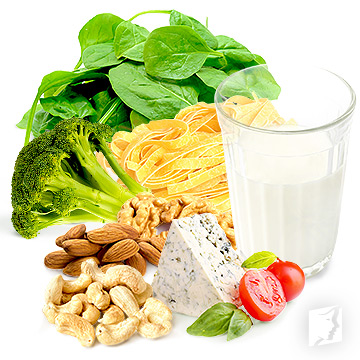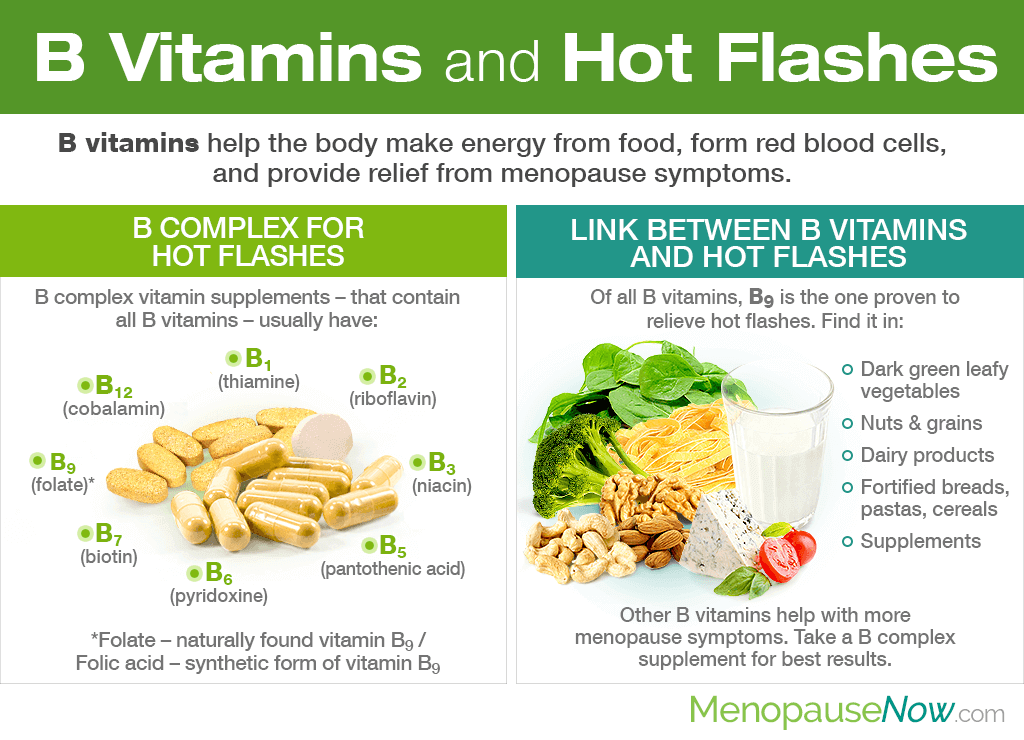Up to 80 percent of menopausal women suffer from hot flashes, and while many are pushed toward finding relief in pharmaceutical measures, like hormone replacement therapy (HRT), oftentimes alleviation can be found in more natural methods, like the supplementation with vitamins.
Continue reading to learn more about vitamins B and hot flashes, including what they are, how they help relieve hot flashes, and further alternative options available for ultimate, long-lasting relief.
What are the B Vitamins?

B vitamins are water-soluble vitamins that are essential for helping the body make energy from the food one eats as well as for forming red blood cells.
B complex vitamin supplements - that contain all B vitamins - usually have the following:
- B1 (thiamine)
- B2 (riboflavin)
- B3 (niacin)
- B5 (pantothenic acid)
- B6 (pyridoxine)
- B7 (biotin)
- B9 (folate)
- B12 (cobalamin)
Para-aminobenzoic acid (PABA), inositol, and choline are sometimes included in B complex vitamins, too.
Although the terms are often used interchangeably, it is important to remember that a B complex vitamin supplement is different from vitamin B12. B complex supplements contain all eight aforementioned essential B vitamins, including B12; whereas, vitamin B12 is a single B vitamin commonly found in animal-based foods.
B Vitamins and Hot Flashes: What's the Connection?

B complex supplements contain folic acid, a form of folate (vitamin B9) that has been scientifically studied for its effectiveness on menopausal hot flashes.
Results have shown that folic acid is successful in reducing the severity, duration, and frequency of hot flashes during menopause, making its consumption recommendable as an alternative treatment plan for symptom relief.
Foods naturally rich in folate include dark green leafy vegetables like spinach; nuts; peas; seafood; dairy products; grains; and beans. On the other hand, foods rich in folic acid are fortified breads, pastas, and cereals.
However, since the body loses some of its ability to absorb vitamins present in foods with age, taking a B complex for hot flashes may be a more attractive option for aging women.
Look for B complex supplement that contains the recommended dietary allowance (RDA) of folic acid, 400 micrograms (mcg) per day.
Although vitamin B12 has been found effective for other menopause symptoms, like tingling extremities or electric shocks, the link between vitamin B12 deficiency and hot flashes has no scientific evidence.
Nevertheless, if women want the best chance at hot flash relief with B vitamins, taking a B complex supplement is the best way to go.
How Else Can I Get Rid of Hot Flashes Naturally?
Menopausal women who are suffering from hot flashes would do well by avoiding any triggers. Most common ones include spicy foods, caffeine, smoking, alcohol, sugar overload, stress, and hot weather.
Other lifestyle changes that can help manage and treat hot flashes include consuming foods rich in phytoestrogens, such as lentils, flaxseed, grains, soy, and chickpeas; adjusting indoor temperature; dressing in layers; practicing deep breathing techniques; and exercising in cool environments.
Nevertheless, optimal hot flash relief occurs when women directly tackle the underlying cause of hormonal imbalance. This can be done principally with the use of alternative medicine, such as:
Phytoestrogenic herbal supplements. Phytoestrogenic herbal supplements, like black cohosh and red clover, contain potent concentrations of phytoestrogens, thus addressing an estrogen deficiency at fault for hot flashes. They are best when used short-term as introducing exogenous hormones into the body can cause less efficient natural hormone production.
Hormone-regulating supplements. Hormone-regulating supplements, like Macafem, nourish and encourage the endocrine glands to produce their own hormones, thus battling the hormonal imbalance at fault for hot flashes and other pesky menopause symptoms. They are safer for long-term use as they do not contain outside hormones.
Key Takeaways
Water-soluble B vitamins have been gaining popularity as a natural way to relieve hot flashes throughout the years. While a derivative of folate, folic acid, has been scientifically proven to reduce the severity, duration, and frequency of menopausal hot flashes, ultimate relief can be found when a B complex for hot flashes is combined with other alternative measures, such as avoiding triggers, making appropriate lifestyle adjustments, and using alternative medicines proven to induce hormonal balance. With a little bit of initiative, your hot flashes will soon be a thing of the past!
Sources
- Bani, S. (2013). The Effect of Folic Acid on Menopausal Hot Flashes: A Randomized Clinical Trial. Journal of Caring Sciences, 2(2), 131-140. doi: 10.5681/jcs.2013.016
- Cleveland Clinic. (2017). Menopause: Non-Hormonal Treatment & Relief for Hot Flashes. Retrieved July 2, 2019, from https://my.clevelandclinic.org/health/articles/15223-menopause-non-hormonal-treatment--relief-for-hot-flashes
- Mayo Clinic. (2017). Folate (folic acid). Retrieved July 2, 2019, from https://www.mayoclinic.org/drugs-supplements-folate/art-20364625
- MedlinePlus. (2015). Folic Acid | B Vitamins. Retrieved July 2, 2019, from https://medlineplus.gov/folicacid.html | https://medlineplus.gov/bvitamins.html
- National Cancer Institute. (n.d.). NCI Dictionary of Cancer Terms: vitamin B complex. Retrieved July 2, 2019, from https://www.cancer.gov/publications/dictionaries/cancer-terms/def/vitamin-b-complex
- National Heart, Lung, and Blood Institute. (n.d.). Pernicious Anemia. Retrieved July 3, 2019, from https://www.nhlbi.nih.gov/health-topics/pernicious-anemia
- National Institutes of Health. (2018). Folate. Retrieved July 2, 2019, from https://ods.od.nih.gov/factsheets/Folate-HealthProfessional/
- Obeid, R. et al. (2016). Folic acid causes higher prevalence of detectable unmetabolized folic acid in serum than B-complex: a randomized trial. European Journal of Nutrition, 55(3), 1021-1028. doi: 10.1007/s00394-015-0916-z
- Office on Women's Health. (2019). Folic acid. Retrieved July 2, 2019, from https://www.womenshealth.gov/a-z-topics/folic-acid

